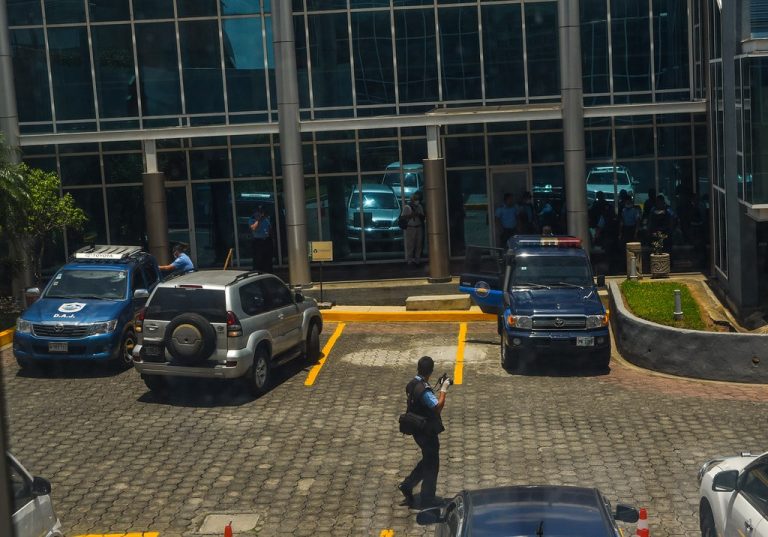31 de mayo 2021

Children of Exile: The Births “Sowing Hope” in the Camp of Nicaraguan Farmers

PUBLICIDAD 1M
PUBLICIDAD 4D
PUBLICIDAD 5D
The empire of arbitrary abuses lies just across the border from savagery. The Un-Rule of Law confronts freedom of expression.

Raid of the studies of This Week and Tonight. Photo: Nayira Valenzuela | Confidencial
“No one would argue that truth or
free expression can
flourish in a place where dogma
squashes all thought.”
-Isaiah Berlin
The Ortega dictatorship’s most recent escalation of their war against free expression contains an underlying message: in Nicaragua, we live in a lawless regime. It’s a State shaped by the Un-Rule of Law. The government’s actions are guided by the whim and will of a group of people with neither brakes nor scruples. Nicaraguans live in absolute uncertainty, just over the border from utter savagery.
The police assault on the production studios of Esta Semana was conducted in broad daylight. It’s the greatest possible evidence of the regime’s completely arbitrary use of power. With no legal order, nor any greater pretext than blind fury, the uniformed police agents arrived to steal, like any organized band of thieves, who spent days surveying their target.
Under this guise, they stripped the locale. Their objective was to make away with everything they found. The only differences between those police and other criminals was the use of force against the reporters who were covering the holdup, and the brazen act of leaving two armed agents guarding the emptied safe.
The fact of entering to steal in full view of all marks a qualitative leap in shamelessness. On previous occasions, they’ve been a little more careful about the ways they operated – committing their crimes at night, with no witnesses except a security guard. This time, no. They wanted to leave a clear message, not just for journalists, but to society as a whole. In Nicaragua, arbitrary authority rules. The rulers have crossed all the lines. Borderlines once marked off by laws, the frontier between coexistence and savagery.
At this level of misgovernment, no one is safe. All of us are targets when those above are guided by their whims, and the tyrants’ moods that morning. In this Un-Rule of Law, there are no friends or enemies, only accomplices – sometimes temporary or circumstantial ones – and traitors. It’s a logic that allows them to snatch whatever they feel like, in seconds. These could be material goods, like houses, businesses, farms, vehicles, equipment for working. Or they could be values, like liberty, honor, respectability, or even life itself. They do this with total impunity, as was seen clearly in the assassination of Jorge Rugama at the hands of an Ortega fanatic in La Trinidad, Esteli, last July.
In the run-up to the November 7th general elections, the Nicaraguan regime has taken one step further towards the abyss. Just when the exercise of political rights should be at a high point, the dictatorship – like other authoritarian regimes, – has turned to force. They want to restrict what’s known as negative liberty, understood as the absence of interference, so that any person could strive to realize their political objectives.
That explains the application of what Schedler refers to as institutional landscaping. This involves a kind of pruning of the country’s institutions. Instead of causing freedom to flourish, the transformed institutions then hinder other political options that aren’t convenient for the autocrats. That’s what has occurred in Nicaragua, with the approval of the tyrant’s laws, the cancellation of the PRDs legal status, the forced reclusion of certain presidential candidates, and the crude scheme mounted against Cristiana Chamorro and other journalists.
The legislation pushed through in the last trimester of 2020 was, in all respects, an attempt to establish a “legalized authoritarian state”. Through a set of coordinated laws, it grants a legal façade to the restrictions being imposed in 2021. These restrictions now appear as if they were based on legitimate rules of play, adopted under the Rule of Law.
However, since dictators never have enough power, they went beyond the legislative intent and imposed still more arbitrary measures. These have been carried out in order to try and close the cracks that each day bring them new uncertainty. The looting of Confidencial was part of their plot against the Violeta Barrios de Chamorro Foundation, and the persecution of other journalists.
All this is nothing strange in a country without institutional checks and balances to counterweight the absolute power of the Ortega camp. To that camp, independent journalism is an annoying fly in their plans to consolidate the tyranny. If the National Assembly complied with their role of controlling the Executive branch; if the courts were independent and adhered to the law; If the electoral council was in reality the fourth power and not the operational arm of El Carmen’s orders to exclude all competitors… If all that were true, then perhaps journalism wouldn’t be the only accountability mechanism left for society.
That’s what we as a country are contemplating. If independent journalism goes down, the possibility of freely exchanging ideas will have died. This is so, even if social media continues existing for a while longer. The regime would impose the dogma that despots spread, pretending it’s the only truth.
This hasn’t happened, even in the darkest moments of our two hundred years as a republic. Right now, the Ortega dictatorship is enjoying a gala moment with their “monopoly of legitimate injustice” (Gellner). They’re transforming the forces of order into a band of thieves. Despite this, the population doesn’t seem disposed to offer them the obedience they demand. Moreover, despite the regime’s arbitrary abuses, journalism is also refusing to renounce its role. It remains as the last guardian of that border that separates freedom from savagery.
PUBLICIDAD 3M
Politólogo y sociólogo nicaragüense, viviendo en España. Es municipalista e investigador en temas relacionados con participación ciudadana y sociedad civil.
PUBLICIDAD 3D